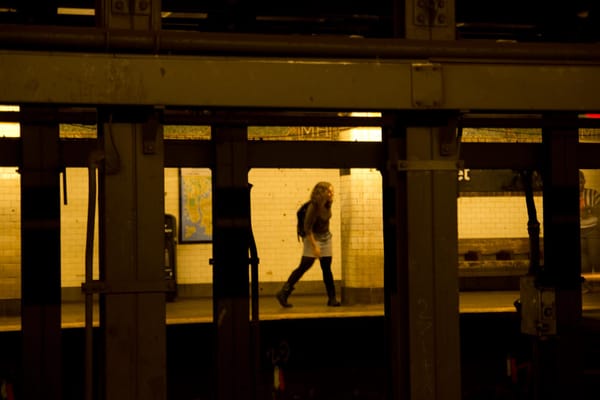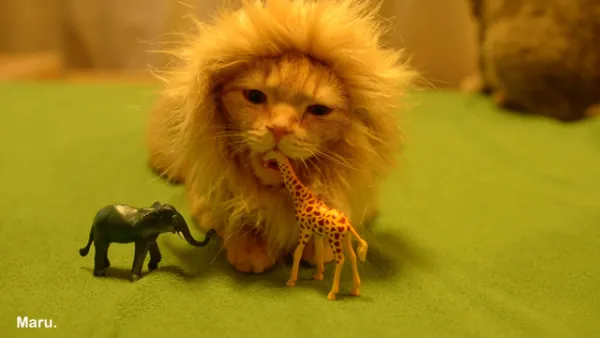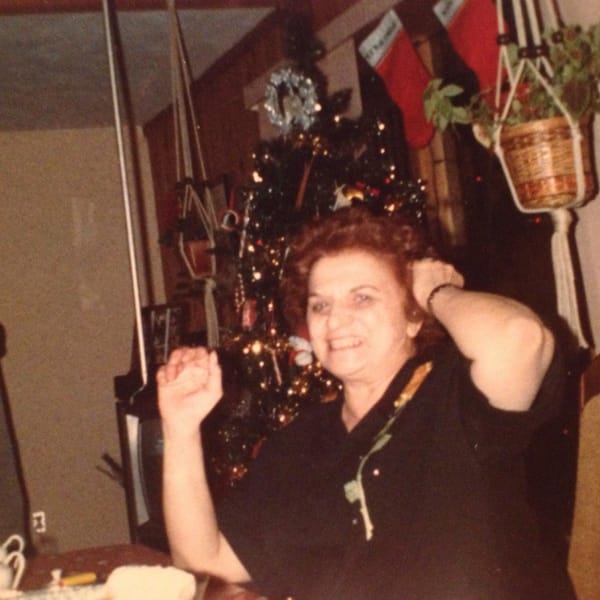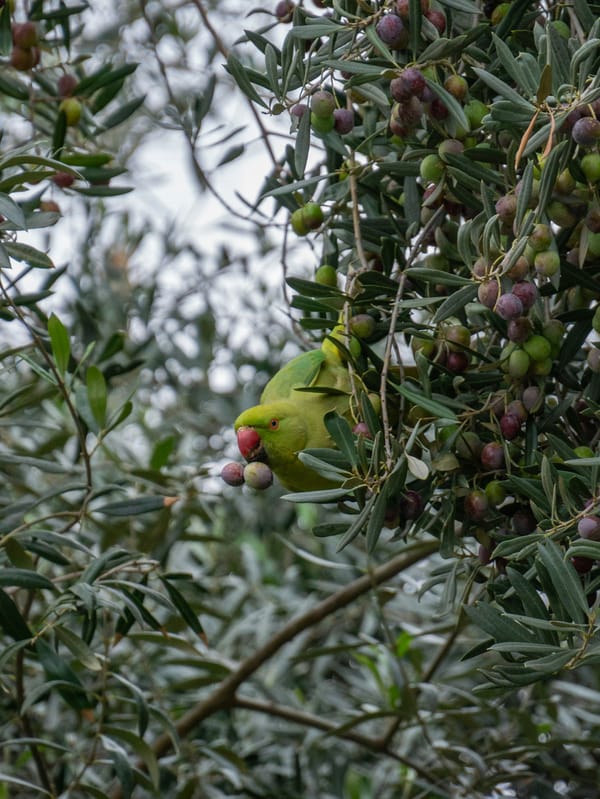Napoli, the Invincible
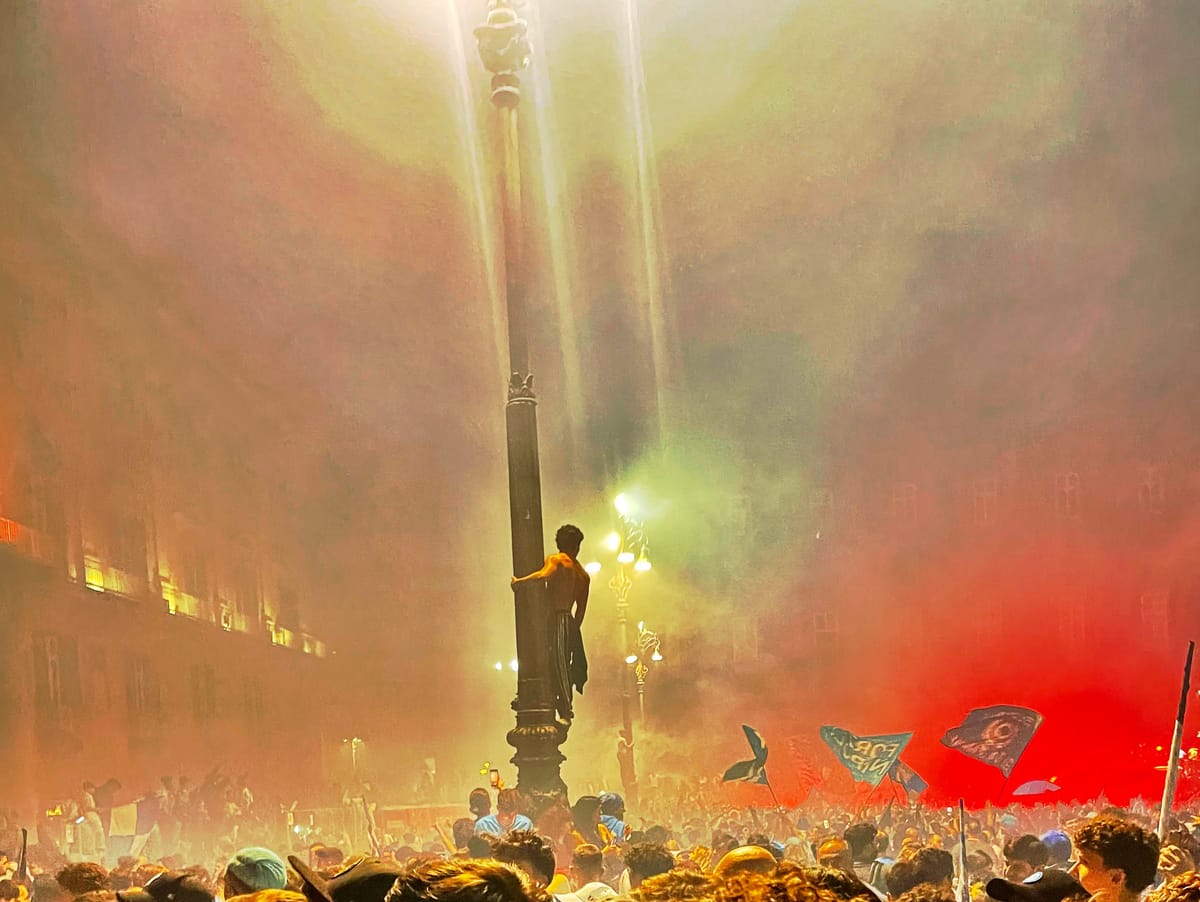
In the early fall of 2002, I had recently returned to New York from Southeast Asia, where I had spent a year aiding and abetting a fugitive. I was, it is safe to say, mildly untethered. So I moved back to the Bronx, mostly because my brother lived there. He was further north in the almost residential part of the Grand Concourse, far from where he taught during the week but close to where he coached high school football on the weekends. Our relationship was complicated but he was, as ever, a safe harbour from the never ending tempest.
It might have been his first season coaching, or just the first season I’d been there to witness, but on one of those Friday nights before game day I went to his house and we had burritos on his stoop, looking out onto 202nd street and keeping it light. They won the next day, and we joked that it must have been the burritos. But because it might have been the burritos, we couldn’t take the chance. So every Friday for the rest of the season, I went to his house and we had burritos on the stoop. And they won. The ritual grounded me, and my life slowly started to take form around it.
Twenty three years later I stood in the Piazza del Plebiscito along with fifty thousand other people as the Napoli football team inched closer to retaking the Serie A title, the Scudetto. They’d done it in 2023 for only the third time in their nearly 100-year history only to drop precipitously and definitively out of contention in 2024. They too were mildly untethered, which endeared me to them even more. I had also just finished writing a guide book about Naples and grown deeply attached in the process. I had friends who lit candles for Napoli, others who had tattoos of Diego Armando Maradona on their chest or back. People I loved dearly, dearly loved this team. They had to win. I called my brother.
“Initiate the Burrito Protocol.”
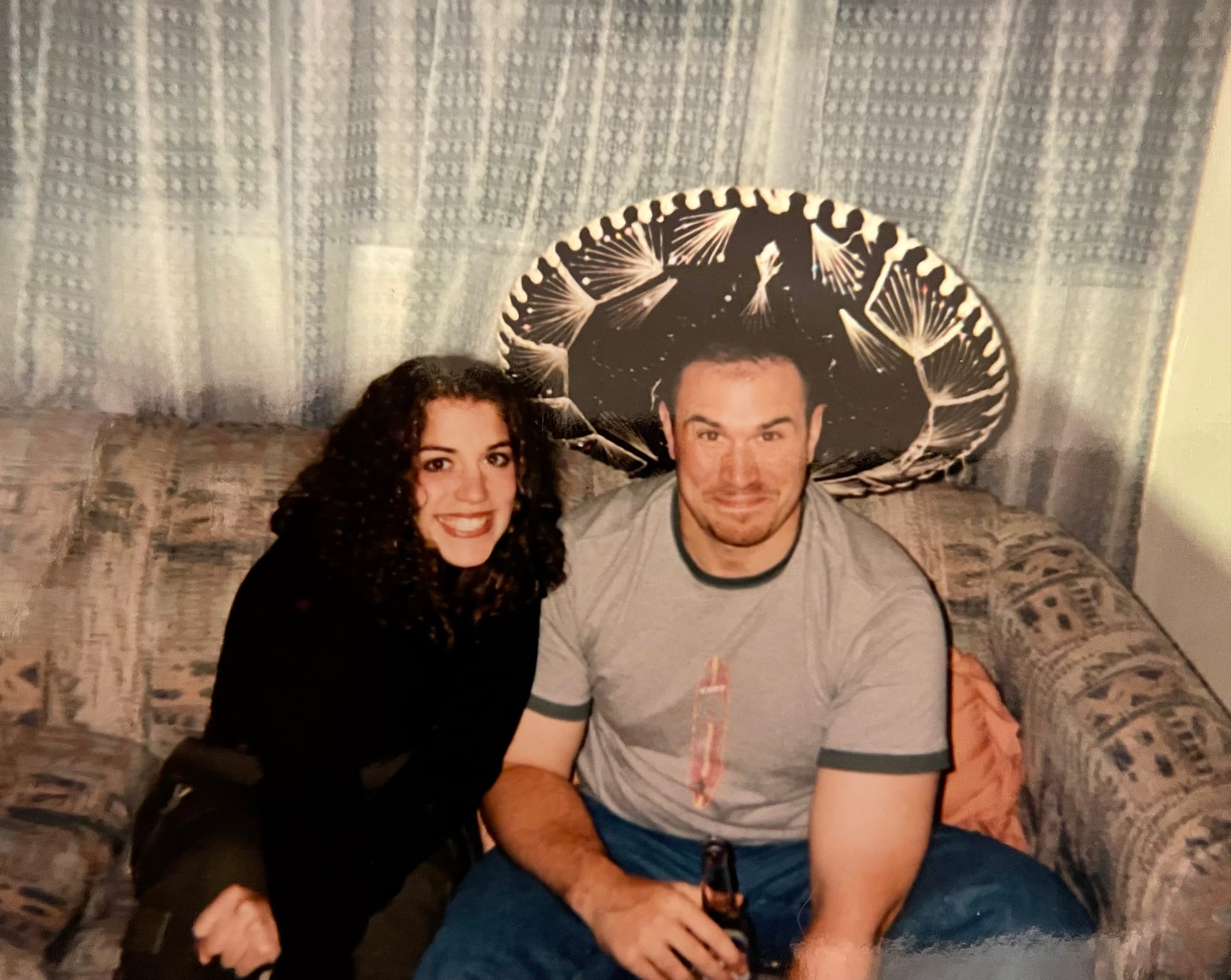
Sport is theatre. Whether it’s a monologue or an ensemble cast, the dramatic tension that builds between rivals is thrilling, and the exaltation of victory is operatic. The impromptu standing ovation we give in the genteel confines of an auditorium is spurred by the same passion that we scream as our team takes it home. You may be entirely indifferent to sport but if you have cried during the symphony when a note hits your heart, you are the same as the most fervent fan. To witness sport in its purest form moves something deep, something primal within us. In its mildest form it allows us to invest in something external and release the pressure valve of our daily lives. In its purest form it is resurrection. I’ll leave you to guess which one took hold in Naples.
Napoli went forward and though imperfectly, they continued to win and climb in the rankings. We continued, on opposite sides of an ocean, to eat. If the team lost I immediately accused him of skipping lunch; if they won I knew he’d done his part. This too is the theatre of sport, the ritual of superstition and magical thinking telling us that we can affect the outcome through our small offerings, the charms and trinkets and rolled up tortillas that we send to the gods as a show of our faith. And it does not matter that it defies logic, it does not matter that my burrito or your lucky underwear are in no way implicated in the outcome of the match. It only matters that we believe, that we commune with whatever divine force takes hold on the field.
In Naples, ritual, occult, and scaramanzia are woven so deeply into the common thread that binds its people together that it is impossible to understand the city without it. And that’s on a good day. When it comes to calcio, there’s not a piece of wood that hasn’t been knocked upon nor an incantation that won’t be said. By February the team had hit a rut; by March they seemed to be rudderless. And then in April the wind seemed to breathe life into their sails again and they won, they won, and they won again. By the beginning of May it looked like they’d win handily over second place (and far less entertaining) Inter Milan: a tentative buzz permeated the ancient alleyways. Then a tie, and another. It was too thrilling to not be scripted, the last match of the season, where Naples would play Cagliari at the mythical Stadio Diego Maradona while Milan played Como against the backdrop of George Clooney’s villa. They’d play at the same time and with one point separating them in the standings, there was no question. Napoli had to win.
The match would be shown on giant screens around Naples, with the largest in Piazza del Plebiscito, where over fifty thousand people were expected to flock. There was no question. I had to be there. The night before we had taquitos, because finding large tortillas in the middle of Rome isn’t as easy as you think. It would have to do.
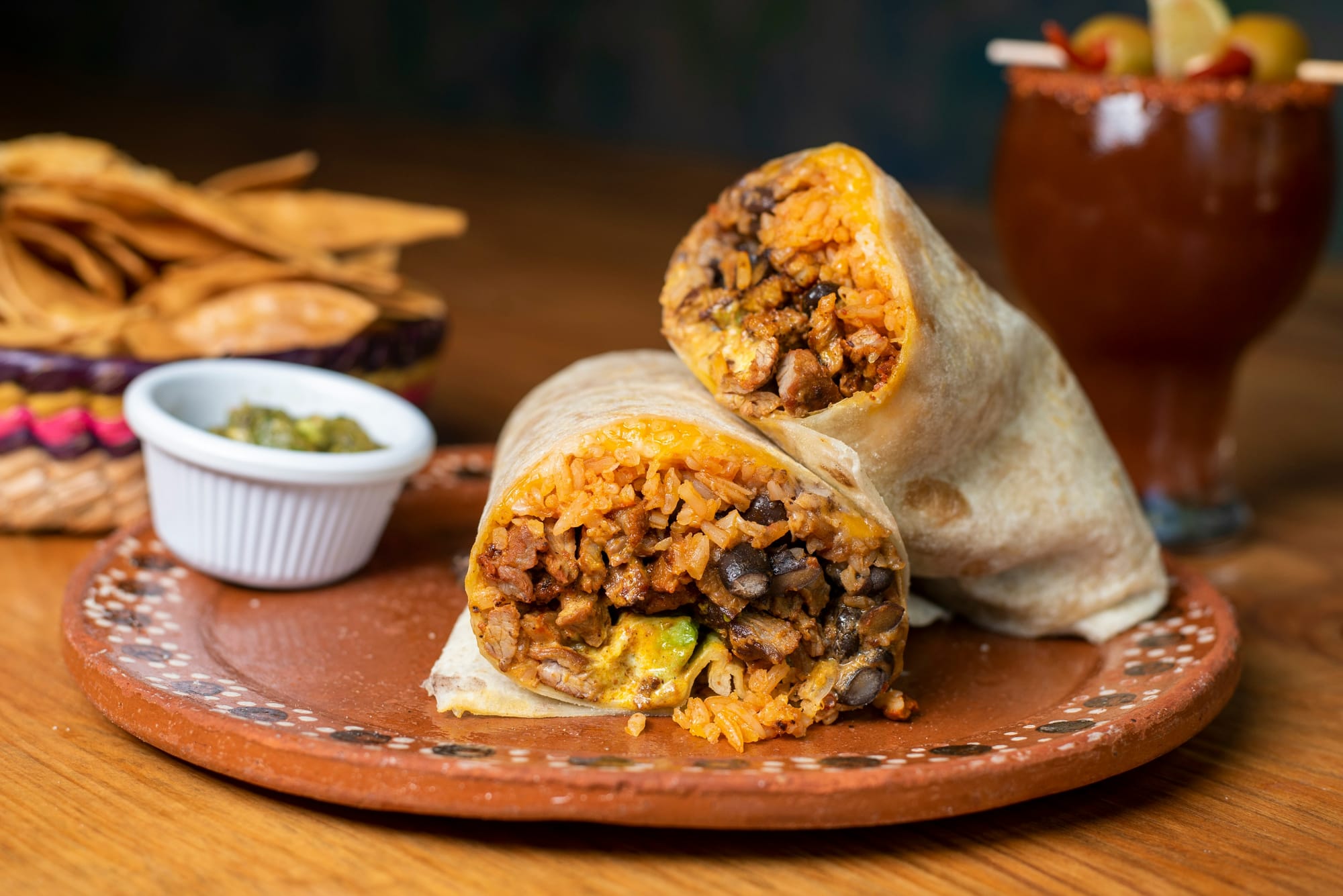
I got to Naples on Friday just after noon and at first glance, nothing seemed particularly different. The train station was a knot of rolling luggage attached to harried travelers who definitely didn’t need to pack that much, and a train strike meant that people clotted together in front of boards announcing one cancellation after another. But once I got out of the metro at Piazza Dante, the air changed and there was almost no break between the azure skies and the sea of blue jerseys and flags on the streets below. I had found a B&B at the last minute, a brand new place in Montesanto called Mareluna, named for the intoxicating song by Pino Daniele that I’d listened to on a loop when I wrote a book on the Mediterranean. As I stepped out onto the hidden terrace I could hear the growing cacophony of plastic horns following the familiar zip of ubiquitous scooters. Anticipation permeated the narrow alleyways that lead to the sea, infusing them with uncommon ebullience. The heady perfume of absolute conviction seemed to blanket the entire city.
By the late afternoon and with still hours to go before the match, shops are closing on via Toledo, the artery that empties into Piazza del Plebiscito. It used to be called via Roma and for many it still is: it also used to be the divide that gently cordoned off the once sinister lanes of the Quartieri Spagnoli. In the past few years, this has become one of the most visited areas of Naples and the transformation is manifest: signs hang between buildings to welcome people to the neighborhood, shops sell spritzes and limonada a cosce aperto, and Piazza Maradona has become the most visited sight in Italy, surpassing the Colosseum in numbers. I spent months here for the guide, writing against poverty tourism and trying to unpack the Maradona Miracle. I often worry about it when I am asked about the threat of overtourism, though I don’t always say so. But today it is joyous, overflowing with the faithful. Here, people will watch the match in their houses but leave their doors open: even if you’re standing in the street, you won’t miss a thing. But I have business, and cannot stay.
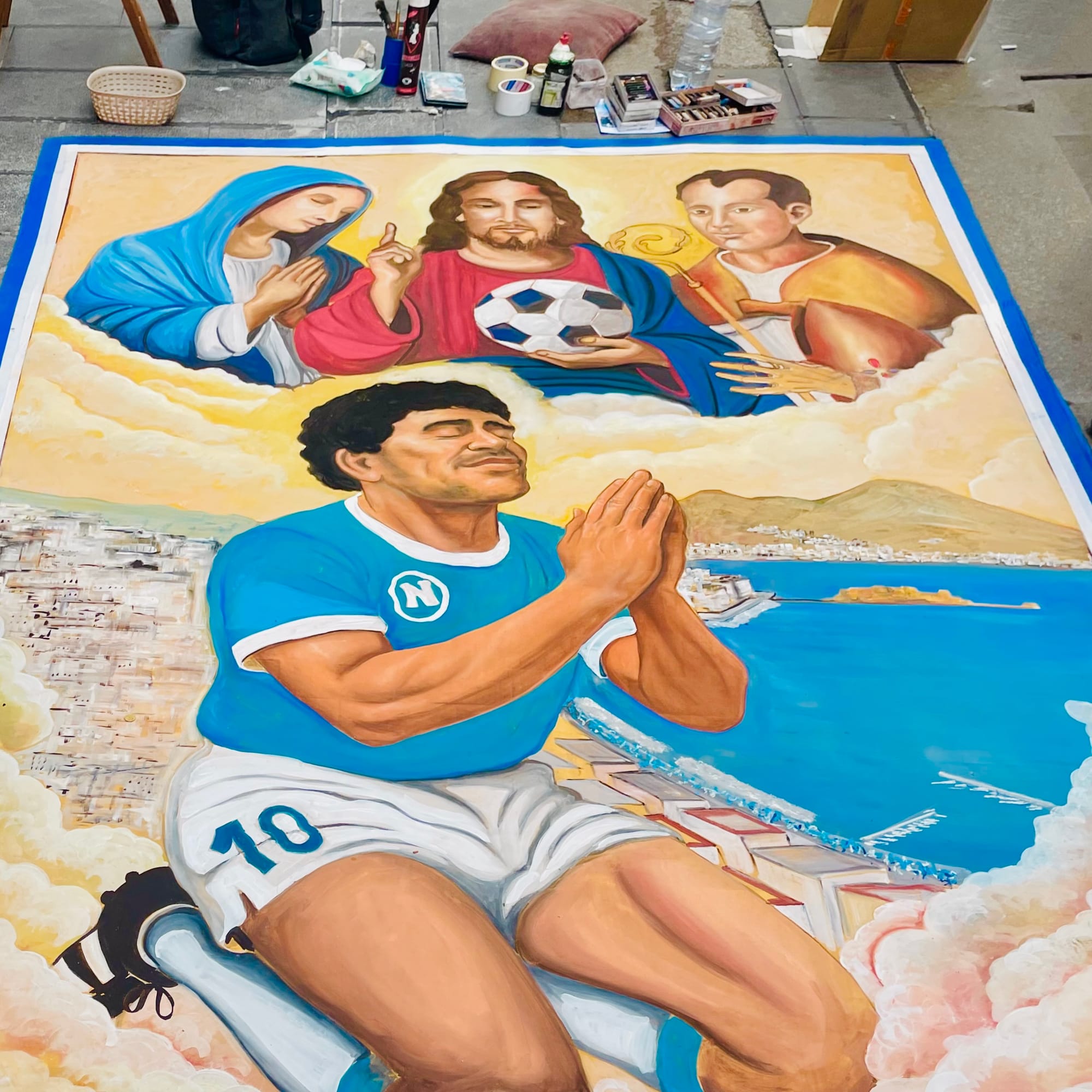
Piazza del Plebiscito is already nearly full, even though the sun is still blazing overhead and the constant stream of bodies means that no one is getting out before the end of the match. Mothers are sitting back to back with their children, some playing cards on the ground and others sharing sandwiches they’ve brought with them. Fathers and sons cite stats, boyfriends chide their girlfriends for bringing a bag, girlfriends quickly retort that half the stuff inside belongs to him instead. It’s the kind of atmosphere you’d see before a concert, when everyone jockeys for positon before the band takes the stage.
For now, it might feel like a concert, but it’s different. There isn’t a set list we’re all waiting for, favorite songs we hope the team will play. This is the great difference between the drama on stage and the drama on the field. Here, nothing is guaranteed, everything is improvisational. There is no script, no cues, no resolution. This whole thing could be all for naught. They might not win, there might be no cause for celebrations. What then? What then do we do with the volcanic eruption waiting to happen, the tremors rippling below the surface?
The crush might come, and it would be no one’s fault. It might go so wrong, and there wouldn’t be a person to blame in it, no one who started the fires. It would be heartbreak, untold and utter heartbreak on a scale impossible to put into words. Heartbreak like that becomes a rampage before anyone has a chance to hold it back. The dam breaks, unable to contain the swell. A palpable tension skims across the surface of those thousands of people, a collective tightening that no one wants to say aloud but everyone undoubtedly thinks. What if we lose? What will we become tomorrow? This is the utter folly of sport, the agony of pouring every ounce of yourself into a vessel only to have it shatter into a million pieces at the slightest touch. Football is perhaps the most lethal variety: with one possession, one missed kick or block, in one inch, you can lose it all. So why, why do we do it? Why have we done it since humanity existed?
Because there is nothing that feels like winning.
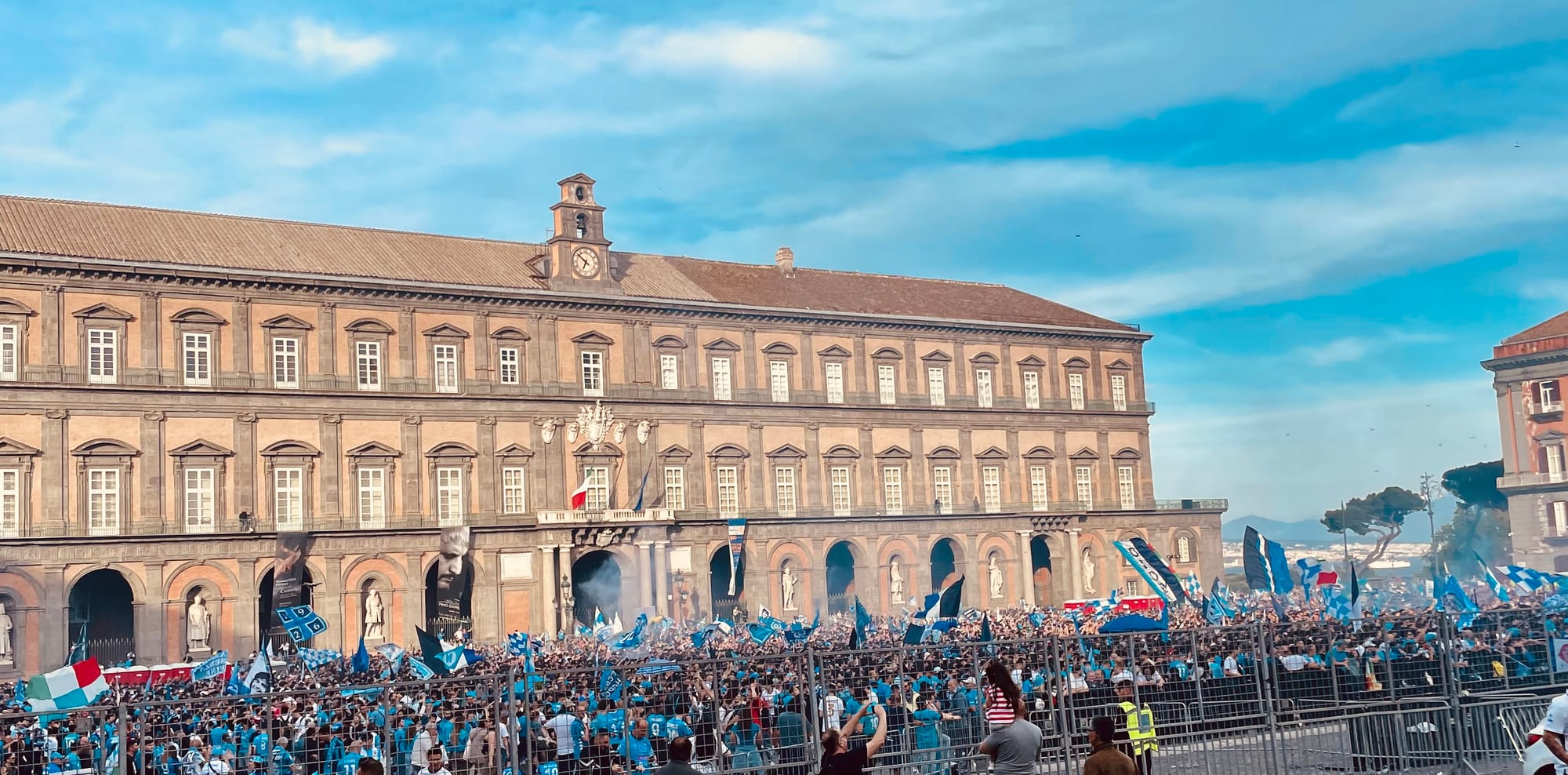
Until the Plebiscite of 1860, the piazza that unites land and sea in Naples was known as Largo del Palazzo. Legend has it that once a month Queen Margherita of Savoy would pardon any prisoner sentenced to death who could cross the vast expanse from the entrance to the Royal Palace to the space between the equestrian statues of Charles III and Ferdinand. The catch? They had to be blindfolded. Legend also has it that no one ever managed to escape execution due to a curse cast by the queen to mock the gullible prisoners. Later on, the Piazza was a parking lot, which only changed in the mid 1990s. Since the piazza has become pedestrian-only, it’s a lot less death defying. But not tonight.
The sun has mercifully made its way west by the time I make it to the small space at the front of the Piazza reserved for members of the press and those requiring assistance, and the massive screen is illuminated with pre-match coverage. The broadcast hops between cities and the contrast couldn’t be more stark. The paltry crowds amassed at the Duomo in Milan draw jeers while the polished pitch in Como looks better suited to a languid stroll than a hotly contested title race. Meanwhile, ninety thousand people have flocked around the Stadio Diego Armando Maradona to greet the team upon their arrival in Fuorigrotta, chanting with the same feverish intensity that once spurred gladiators onward. From a perch at the Royal Palace, cameras pan over the swell in Piazza del Plebiscito, where the air is already thick with the acrid fog of flares and smoke bombs. Untold volumes have been written about the contrast between the genteel North and the ferocious South in Italy, but one would only have to look at the two scenes to understand everything. Sometimes words are useless.
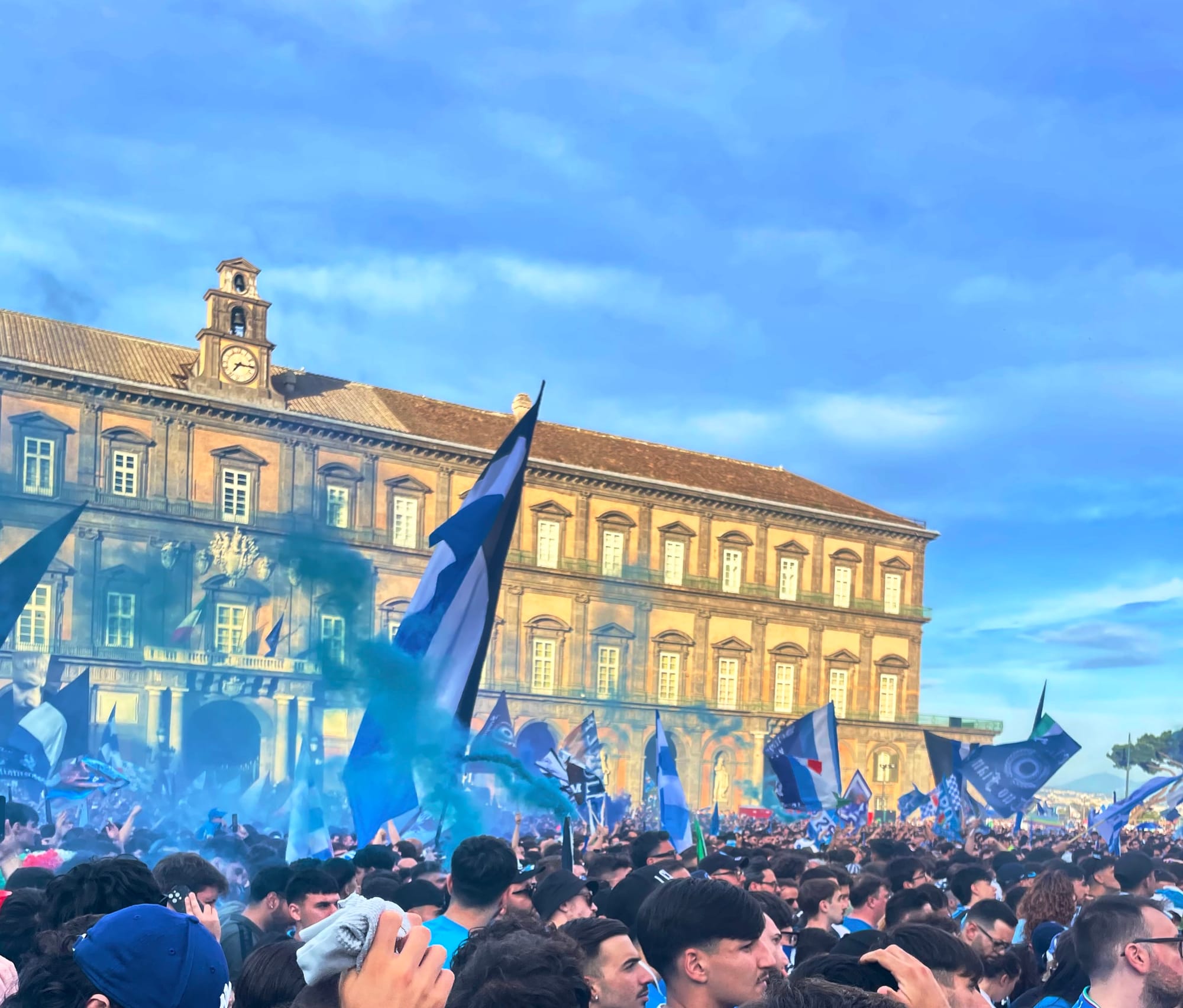
I find a spot in the reserved area, which is separated from the rest of the crowd by chest high barriers that are fitted with bench seats for those with limited mobility. Next to me, a kid is trying very hard to play it cool in front of the security guards who absolutely know that he snuck in. We exchange looks and I give him a nod like we worked the metro beat together in the 80s; he smiles back and we look at the security guards to reassure them we both belong there (neither of us do, I can assure you). Once they disperse, my colleague gets a tap on his shoulder from the other side of the barricade: one of his friends wants in. He does what any teenager would do and assents, moving off of the bench seat to allow his friend a foothold. But it isn’t just one. In a flash, six young bodies have vaulted over the fence, each with varying degrees of agility and all making a very obvious display of their triumph. In seconds, a guard is in front of him and the look on his face is unequivocal. And anywhere else, those kids would have been chucked out, maybe even arrested. But here, in this vast sea of cousinhood, the guard looked down at them with the same gaze my grandmother used to give us when we crossed the line and said,
“Siete stati fortunati. Ora dovete meritartelo.”
You were lucky. Now you need to earn it.
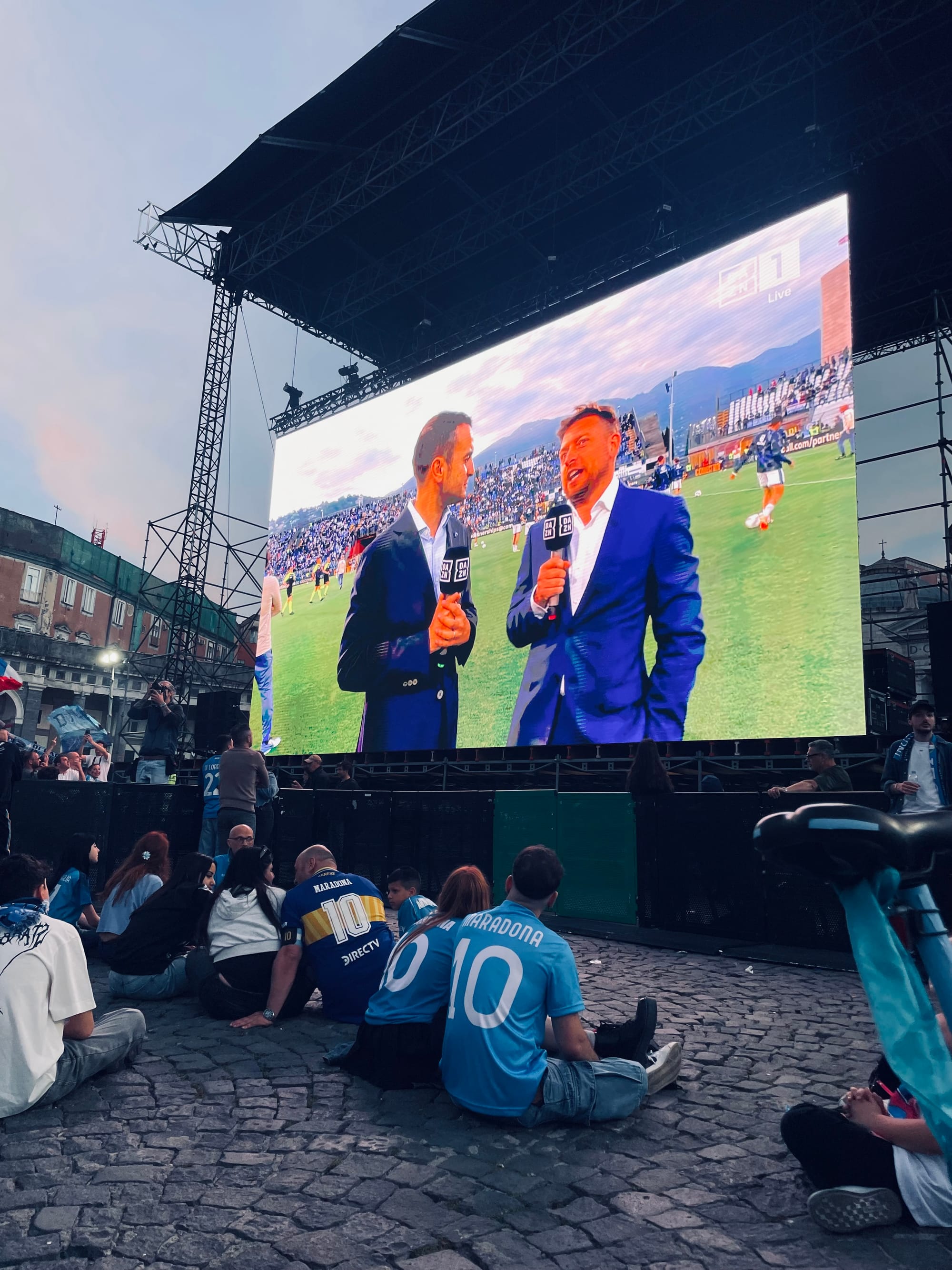
As night fell the crowd huddled closer, taken by the chill that often descends in these early summer days. The flares multiplied in the sky while the tactical analyses on the screen gradually gave way to the sight of the teams taking to the pitch; with every inch the crowd grew enraptured, caught in the same heady grip that two lovers feel right before their first kiss. By 830 pm even more people had hopped the fence and the guards returned with warnings. “Be aware when you celebrate not to hurt the people who are here because they need it,” gesturing to a man in a wheelchair next to me (or did he mean me?). A bright eyed man retorted quickly, “let’s just hope there’s a reason to celebrate!” and they both laughed, clasping their hands in prayer and wagging them plaintively. Cousinhood reigned where rules simply could not apply. As the clock ticked down I thought of every person I knew would be watching and every ritual they would observe. I thought of the lump in each of their throats, the anticipation that would keep them hovering over their seats, unable to move and unable to stand still. As the teams took their positions a war cry rang out over Piazza del Plebiscito, a charge of such atomic force that it could have held off an army. Game on.
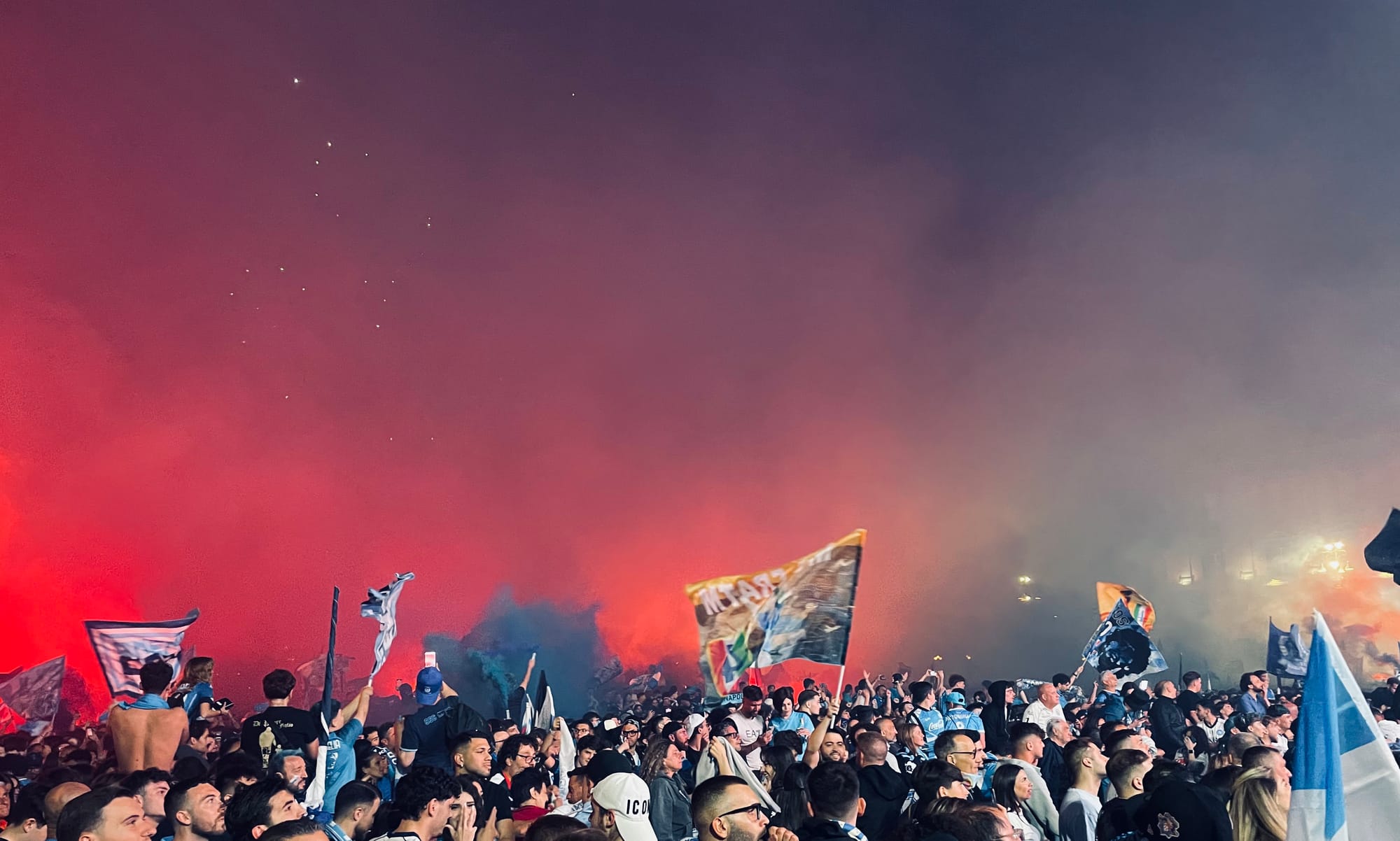
There are infinitely more qualified accounts of the match than I could ever hope to offer, but I can share some of my notes from this strange frontline:
12 minutes: Jesus Christ
25 minutes: Jesus Christ
34 minutes: really? The robots will be the ruin of us all. 5 minutes delay!
39 minutes: JESUS CHRIST
42 minutes: Explode.
The ecstasy that took hold of that crowd on the back of a skinny Scottish kid whose name many can’t even pronounce will remain one of the most unforgettable moments of my life. The six lucky kids huddled and lept. An old man danced on his chair. A woman with a broken leg spun in circles like a Haggis and fireworks launched into the air from every direction. At the half, I saw the owners of the Mareluna B&B sitting not twenty meters away from me and was not surprised at the twist of fate that should have made it that way. We were friends by then and though they’d entertained the idea of going back to their house in Pozzuoli, they changed their minds. Despite what they knew would be an interminable trek home, despite the chaos, the traffic and the noise, they had to be here.
“Cosi, vivi Napoli,” they said. You’re living Naples here. This is what it means to be here. This joy, this moment. I returned to the patch of cobblestone I’d been sitting on before because I couldn’t risk it. My brother wouldn’t have moved from his spot for love or money, and neither would I.
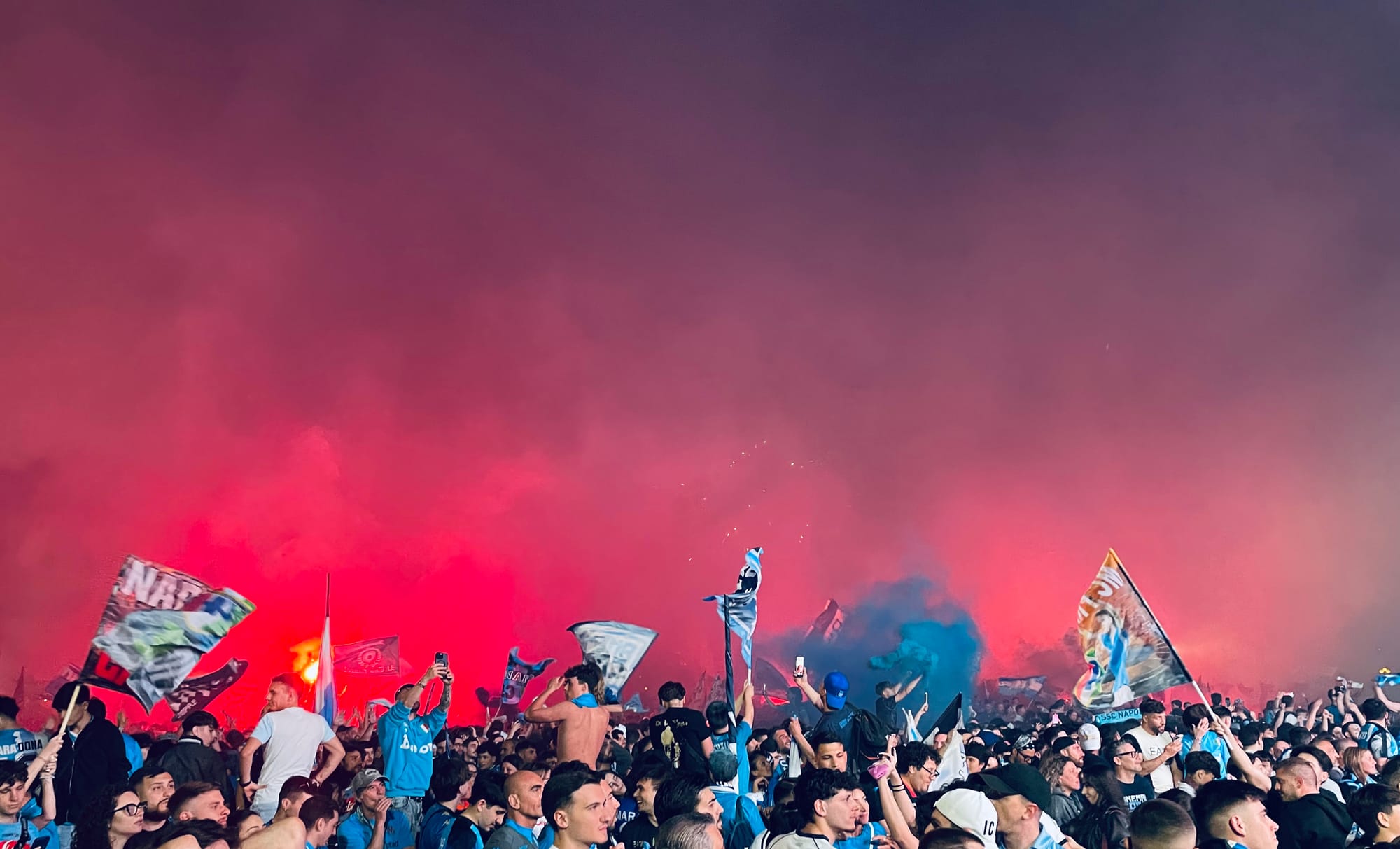
Second half:
47 minutes: the giant maxi-screen is on standby, and now it’s powering off in front of fifty thousand people. Naples really is the world’s largest living room.
48 minutes: the screen comes back and a massive cheer erupts because nothing terrible happened. I’d have lost every burrito of the year.
51 minutes: gogogogogogothankgodddddddd
When Romelu Lukaku scored the second goal for Napoli, the taut energy turned supple: the match was far from over but if they could hold on and hold the other team back. If. The point in a battle where the word if gets bandied about is almost always the turning point, the moment when a clenched fist starts to decontract, allowing the muscles to flex and throb on their own. By the 87th minute a steady roar began to echo beyond the Piazza, restrained by the still persistent possibility of losing it all but irrepressible nonetheless. By the 92nd minute, smiles began to broaden wide, wide, wider still. And at 94 minutes, under a haze of colored smoke, the fire. The final whistle.
“Siamo noi, siamo noi, i campioni dell’Italia siamo noi…”
We are the Italian champions. We, the white Scottish kid and the black Belgian kid and the old man dancing and the security guard and the mothers who waited and the nuns who prayed and my brother and your brother and you and me and anyone who believed in it. We, with the lumps in our throats and the tears in our eyes and the hundred little things we did because we had to try, we are the champions. Because Naples belongs to those who believe.
It took me an hour to walk the kilometer from Piazza del Plebiscito to the Mareluna in Montesanto, and if you’d told me that the entire population of nearly a million were there I’d have believed it. But there were no fights, no threats, no unwelcome advances. Cousinhood prevailed and even in the tightest crush of revelry people made room for an old man with his dog and his cane to pass through. People played music from balconies on Via Toledo and thousands sang along down below. I only noticed that I hadn’t eaten at all that day when I walked past a friggitoria on Via Montesanto and saw piping hot pizzas in the plexiglass window. For four euro I had one with a Peroni, and before I’d even sat down on the sidewalk both were finished. The sound of plastic horns grew distant as I walked up the stairs, and when I sat on the terrace I swore I could hear the sea lapping at the shore. I texted my brother. “They won!” He sent back one word.
“Champs.”
When I woke up a few hours later the horns had stopped, replaced by Pino Daniele’s ode to the traveler, “Again”. It wasn’t released until more than a decade after his death, but he’d talked about its meaning when he recorded it. “I realized something after traveling around the world spreading my, or indeed our, music. What counts in the end are the memories. It’s us, with our history and with our work, with what we do every day. Whether we do it in Brussels, in Naples, in Rome, somewhere else, it is us. This piece is dedicated to you.”
As I packed my bag and made my last notes I thought of what Napoli coach Antonio Conte had said in a press conference before the final match. “We don’t want to read history, we want to write it.” I thought of every kid waking up that morning and immediately watching the replay of that glorious McTominay goal, how they’d never forget where they were when they saw it. I thought of my grandfather listening to the Yankees win the World Series on the radio, of my father running onto the field in the Bronx when Chris Chambliss won the 1976 pennant two days after my brother was born. I thought of my brother and I on his stoop in the Bronx, eating burritos and knowing that it might all go wrong but believing in it anyway. I thought of those six kids who’d hopped the fence last night and gotten the best seats in the house. They’d talk about that night for the rest of their lives. Because they got lucky, just like me. I hope we all earn it.
